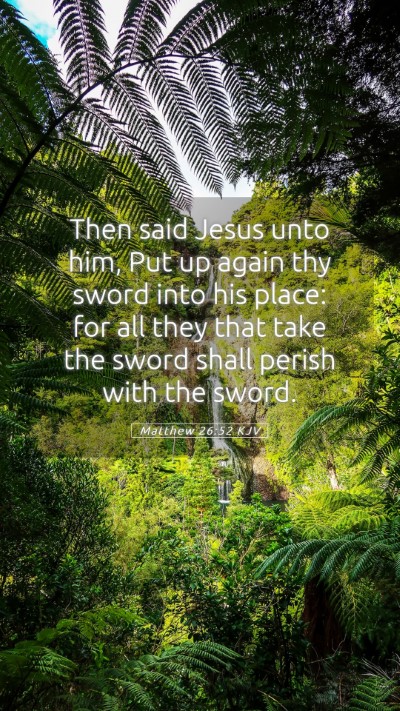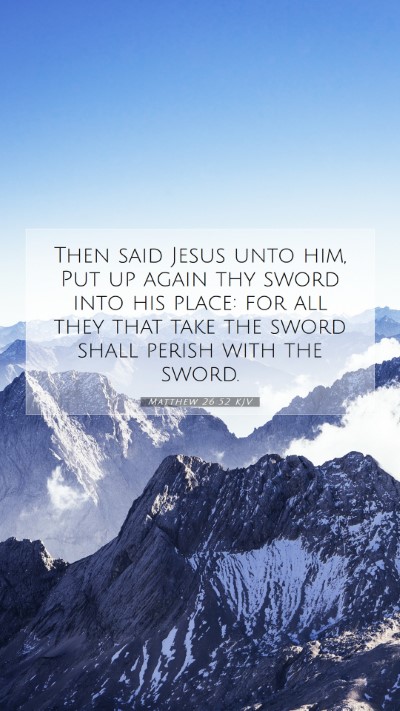Understanding Matthew 26:52
Bible verse: "Then said Jesus unto him, Put up again thy sword into his place: for all they that take the sword shall perish with the sword." (Matthew 26:52 KJV)
Summary of Insights from Public Domain Commentaries
Matthew 26:52 captures a profound moment during Jesus' arrest in the Garden of Gethsemane. This verse reveals critical themes within Jesus' ministry, which includes the teachings on violence, self-defense, and the path of peace. Each commentary provides insights that deepen our understanding of this scripture.
Matthew Henry's Commentary Insights
- Context of the Passage: Matthew Henry emphasizes that this verse occurs during a tumultuous time, illustrating Jesus' calm demeanor amid His imminent crucifixion. Jesus’ words serve to highlight His mission of peace and His rejection of violent resistance.
- Admonition Against Violence: Henry interprets Jesus' statement as a clear rebuke against the use of force. It conveys that those who seek violent means will find themselves entrapped by violence, reinforcing the cycle of harm.
- Spiritual Warfare: This commentary also points out that Jesus is more concerned with spiritual battles than physical ones, suggesting that faith, rather than the sword, is how Christians should engage in their struggles.
Albert Barnes' Commentary Insights
- Literal Meaning of the Sword: Barnes discusses the literal instruction given to Peter to sheath his sword, signifying not only the futility of fighting against God's plan but also the idea that physical force is not the solution to spiritual issues.
- Consequences of Self-Defense: He expounds that those who rely on violence for protection or justice are likely to bring destruction upon themselves, suggesting a natural law of repercussion.
- Jesus as a Model of Peace: Barnes emphasizes that Jesus’ response models an ideal for believers, urging them to emulate Christ's example of nonviolence even when facing persecution or suffering.
Adam Clarke's Commentary Insights
- Historical Context: Clarke delves into the historical context of the Garden of Gethsemane and the socio-political backdrop, arguing that Jesus was preemptively addressing a mindset prevalent among His followers that sought to establish the kingdom through force.
- Theological Implications: Clarke underscores the theological implications of the verse, noting that reliance on physical weapons contradicts the very essence of Jesus’ teachings. He links this verse to the overall theme of the New Testament that promotes love and forgiveness.
- Cultural Reflections: He presents reflections on the cultural understanding of swords, suggesting that they symbolize authority and power, which Jesus subverted by promoting humility and servitude instead.
Application for Bible Study
The teachings of Matthew 26:52 can significantly impact one’s approach to conflict in personal life and broader societal issues. By rejecting violence, believers can align their actions with the principles of love and forgiveness embodied by Jesus. Here are some areas of practical applications:
- Conflict Resolution: Emphasize peaceful resolution over escalation in disputes.
- Self-Reflection: Evaluate personal responses to conflicts and the role that anger or aggression plays in them.
- Community Engagement: Foster a community spirit that promotes dialogue and understanding rather than division.
- Encouraging Forgiveness: Implement principles of forgiveness in daily interactions, reflecting Jesus' teachings.
Related Bible Cross References
- John 18:11 - "Then said Jesus unto Peter, Put up thy sword into the sheath: the cup which my Father hath given me, shall I not drink it?"
- Romans 12:19 - "Dearly beloved, avenge not yourselves, but rather give place unto wrath: for it is written, Vengeance is mine; I will repay, saith the Lord."
- Matthew 5:39 - "But I say unto you, That ye resist not evil: but whosoever shall smite thee on thy right cheek, turn to him the other also."
- 1 Peter 2:21-23 - "For even hereunto were ye called: because Christ also suffered for us, leaving us an example, that ye should follow his steps."
- Luke 22:36 - "Then said he unto them, But now, he that hath a purse, let him take it, and likewise his scrip: and he that hath no sword, let him sell his garment, and buy one."
Conclusion
Matthew 26:52 serves as a powerful reminder of Jesus' ethos regarding violence and the conflict. By exploring this verse through the lenses of esteemed commentators like Matthew Henry, Albert Barnes, and Adam Clarke, we uncover a profound commitment to peace that challenges the often violent instincts of humanity. Believers are encouraged to embody Jesus' teachings by prioritizing peaceful solutions in all aspects of life, promoting a culture of understanding and love.
Further Study Resources
For those looking to dive deeper, consider using various bible study tools and bible study resources that provide guides and lessons focusing on nonviolence and peaceful living as taught in the New Testament. Online Bible study groups can offer community perspectives, making interpretation a shared journey that enhances understanding of scripture.


